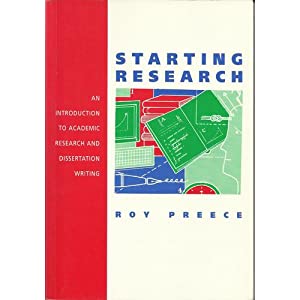Book review: Starting research: An introduction to academic research and dissertation writing – Roy Preece
This book is written for any student undertaking research for the first time. Although the book seems to be written from the perspective of social sciences, there is good information for science and engineering students in it as well.
The first three chapters give an introduction into research itself:
Chapter 1: What is research?
Chapter 2: Elements of scientific method
Chapter 3: Te logic of scientific method
If you have never taken the opportunity to get a good understanding of the scientific method and the nature of research, this book provides an excellent description. Even though the writing style is rather academic, the text of these chapters shines a light on what research is and how science is undertaken.
The following chapters are fully oriented towards the social sciences:
Chapter 4: Information in research
Chapter 5: Methods of primary information collection
Chapter 6: Organization and analysis of surveys
Especially chapters 5 and 6, which deal with interviews and surveys, were too far away from my daily research practice and general understanding to benefit from this reading. In fact, I mainly skimmed through these chapters.
After a chapter about statistics (Chapter 7: You can understand statistics), to chapters which I found very valuable are:
Chapter 8: The research question
Chapter 9: The research dissertation
These chapters focus on writing your dissertation. Within chapter 8, the requirements for a dissertation are discussed, and attention is given to the research question and hypothesis. A few pages are dedicated to the literature review (“Background reading”) and useful advice with respect to the use of libraries and recording information is given. In chapter 9, the dissertation writing itself is more deeply discussed: from writer’s block and how to organize the dissertation to the format of a typical dissertation and how to use references properly.
In chapter 8, the link between research itself, its structure and the structure of the dissertation are made. I particularly liked this breakdown:
“A dissertation is a substantial and complex piece of writing but a good dissertation can be seen to be constructed from a few essential and distinct parts.
1. Justification – why the research question is important and should be investigated; limitations of the research due to constraints of time, resources or information.
2. Background (literature review) – what is known about the topic so far; in particular, what other relevant research has been carried out.
3. Introduction to the empirical work – why the particular experiments, surveys or case-studies have been identified as relevant to the topic.
4. Design of the empirical work – how the empirical work has been designed in detail to relate to the topic (for example, methods of measurement used).
5. Results of the empirical work – description, tabulation, analysis and critique of the empirical work.
6. Inferences – use of the results and other evidence to make rational conclusions about the topic.
7. Discussion – a review of methods, results and inferences; any limitations to the applicability of the results due to, for example, lack of resources or variables not investigated; some speculation about relationships involving the topic; possible future work.
Running through each stage, except stage 5, is the motif of the research question; it is the touchstone against which the relevance of every point and sentence of the dissertation is judged.”
A great feature of this book is that every chapter is summarized in a set of conclusions (check list) at the end, and plenty of references are available at the end of every chapter to allow further reading.
To conclude, I must say that this book was not an easy reading for me. I had to get adjusted to the topic, it challenged me to take some distance from my research and judge my analytical procedures. Nevertheless, I absolutely value that this book gave me a better insight into the nature of research itself.


A thorough review, thanks 🙂 I've never heard of this book but I'll check it out now!
Thank you! The book's written from the perspective of the PhD program from the UK.